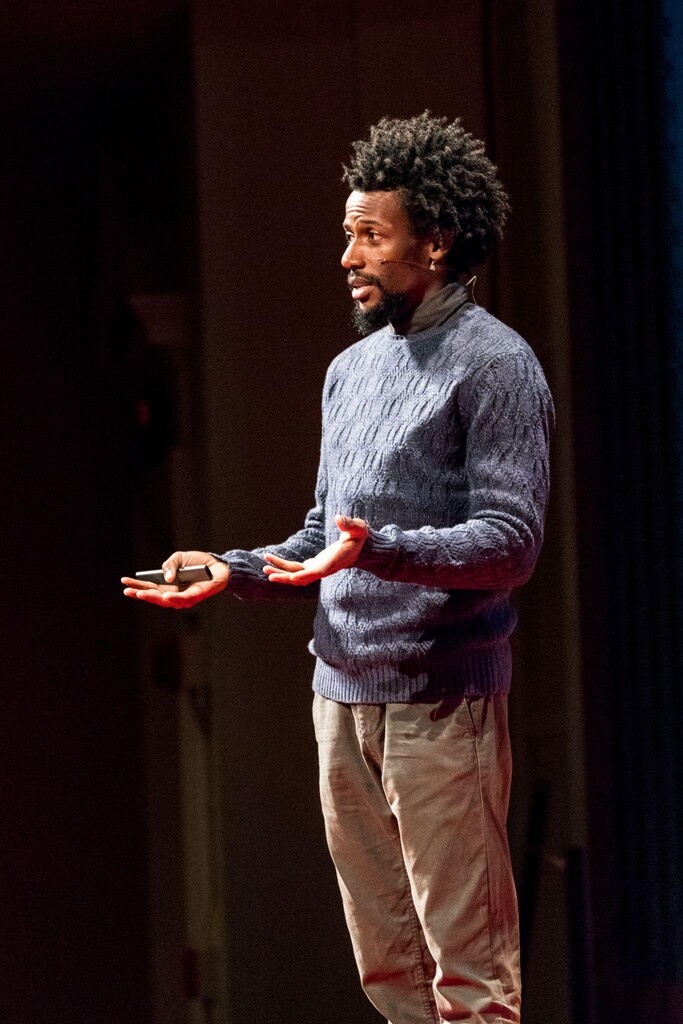Honoring Real-Life Superheroes : The Power of Art
Nikkolas Smith discusses “The 1619 Project: Born on the Water? and inspiring positive change
By Nicole Travis, University of Delaware senior and intern for the University of Delaware’s Center for Political Communication
Watch the video. Read the transcript. View Nikkolas Smith’s art on Instagram. Listen to an event recap on Delaware Public Media.

NEWARK, Del. – Artist Nikkolas Smith brings attention to real-life superheroes, past and present. “I do a lot of portraits and I want them to be looking at you directly in the face so that you can see their humanity. So that you can see, for a second, just to put you in their shoes,” said Smith. The University of Delaware welcomed the illustrator and self-proclaimed “artivist” to the historic Mitchell Hall Theatre on Nov. 17.
Smith said he wants his portraits to kickstart important conversations about social justice in today’s world, and to inspire meaningful change. “These are humans, these are people who are struggling with very real issues. Why can’t we all just understand that in some way we’re all the same, and that we should all really be rooting for each other rather than tearing each other apart?”
Smith joined series director Lindsay Hoffman, Ph.D., on stage at Mitchell Hall Theatre for the sixth and final event of the National Agenda 2021 “Reflecting America” series, presented by the Center for Political Communication. In-person and virtual audiences tuned in to hear how art enables citizens to make a difference.
A native of Houston, Texas, Smith most recently illustrated “The 1619 Project: Born on the Water,” a children’s book written by Nikole Hannah-Jones and Ren”e Watson to accompany the book, “The 1619 Project: A New Origin Story.” For Smith, the project was a chance to contribute to the conversation about racial injustice in America. “It is one of the most important broken bones that we have in this country and something that we deal with constantly,” said Smith. “And until we actually have that deep conversation about how this country was formed, we’re never going to really go anywhere.”
Smith’s career began as an architect with Walt Disney Imagineering, where he spent 11 years creating magical details at theme parks such as pixie dust in the bathroom of Rapunzel’s Tower. Although the job of an Imagineer was glamorous and rewarding, Smith left to pursue his passion for art full time.
Today, Smith has moved from princesses to superheroes, one of his favorite things to bring to life. Instead of Marvel superheroes, Smith is interested in “people who don’t get talked about a whole lot,” like Robert Smalls. “He was born enslaved in 1839,” he told the audience at Mitchell Hall. “He stole a Confederate ship. He disguised himself as captain; used secret hand signals to pass confederate ships and he rescued more enslaved people. He escaped to freedom and then he ran for Congress, and he became a congressman, like this is real life. This actually happened and I’m like, ‘Well why didn’t I learn about things like this?’” said Smith.
Smith also described his “digital speed-painting” technique to create impressionistic portraits of both historic and modern superheroes, such as George Floyd, Chadwick Boseman, and Officer Clemens from “Mr. Roger’s Neighborhood.” He adopted the technique so that he could process traumatic moments but also create a tribute for the person. “It’s just like trying to honestly put all of that energy, and anger, and hurt into a very quick painting – It’s like drawing on the iPad pretty much. And, after about an hour or two, usually I have something that I’m like, “Okay, this tells what I wanted to say.’”
While discussing “The 1619 Project,” Smith responded to claims that critical race theory doesn’t fairly present the facts. “This is one of the most patriotic books ever made. Books like this are trying to hold America’s feet to the fire to say, ‘If we’re going to say liberty and justice for all, then we have to actually hold America to that.’ If we are going to make kids say the Pledge of Allegiance every morning and sing these songs and do all these things and then talk to them about George Washington but leave out the people that he owned – you know, these things happened.”
“When I first read the poems, I just got chills,” said Smith, reflecting on the writings of Nikole Hannah-Jones and Renee Watson. “This is something that I wish I had when I was a little kid … to say this is how everything went down, and these are my ancestors. They actually did way more than the textbooks are giving credit for. And I can be proud of that.”
Smith is the author/illustrator of “The Golden Girls of Rio” (nominated for an NAACP Image Award), and “My Hair is Poofy and That’s Okay.” While many of his viral sketches are included in his book “Sunday Sketch: The Art of Nikkolas,” his works have also been widely featured in the media, including TIME Magazine, the New York Times, the Washington Post, CNN, Buzzfeed, the Academy of Motion Pictures, The Guardian, ABC, NBC, KCET.
About National Agenda
For information about National Agenda, including links to videos, news stories, and transcripts, visit cpc.udel.edu/nationalagenda. Lindsay Hoffman, Ph.D., an associate professor of communication and political science at UD, directs the series. This year’s theme, “Reflecting America,” examined how this historic era of political divides, social movements, and economic upheavals – fueled by the pandemic and politics – is redefining America. National Agenda is free and open to the public. It is made possible with support from the University of Delaware’s Office of the Provost and the College of Arts and Sciences.
